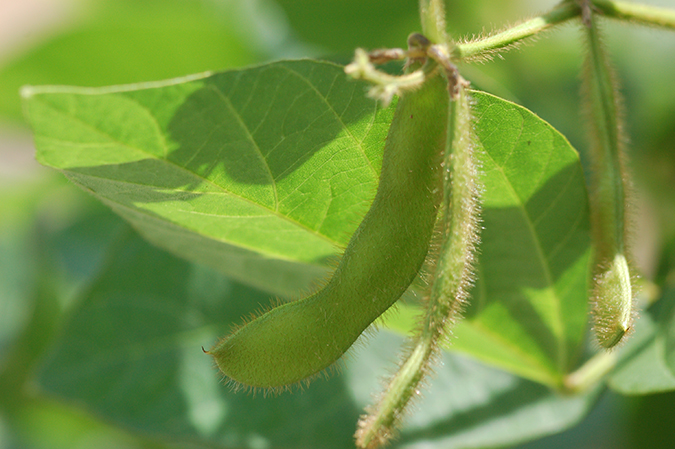| |
1:25 p.m. September 1, 2015
UT Gardens September 2015 Plant of the Month: Edamame
By Natalie Bumgarner
Assistant Professor of Residential and Consumer Horticulture and the Tennessee Extension Master Gardener Coordinator

Gardeners all across Tennessee can enjoy success with certain varieties of edamame, or vegetable soybeans. These vegetable soybeans are nearing harvest in the UT Gardens, Knoxville. Image by N. Bumgarner, courtesy UTIA. |
Soybeans gently waving in the breeze is a familiar sight along highways and country roads in many parts of Tennessee this time of year. Most are familiar with this plant as an important agronomic crop. What may be less familiar is the soybean as a fresh vegetable crop grown by specialty producers and home gardeners because of their high nutritional content and convenience.
Called “vegetable soybeans” or the Japanese term “edamame”, these soybeans are the same species (Glycine max) as field soybeans. Vegetable soybean cultivars, though, have a larger seed and are generally sweeter and more digestible. Although this crop was reported in the U.S. in the 1850’s, variety collecting and testing increased in the early to mid 1900’s. Current varieties now represent Asian introductions as well as U.S. lines or crosses between the two.
Soybeans are sensitive to day length, so varieties are most productive when they are grown in specific latitude ranges. ‘Midori Giant’ is a cultivar that has performed well in Tennessee, but there are also many other possibilities. Most seed suppliers will be able to provide suggestions for your region.
Growing edamame is quite similar to other warm-season bean crops. After serious threat of frost has passed, seeds are planted in a full sun location in well-drained soil approximately 1 inch deep and 2 to 3 inches apart in rows spaced 15 to 30 inches apart. Germination and early growth are best when soil temperatures warm to around 65°F. If soybeans have not been previously grown on your site, inoculate with rhizobium, a bacterium to support nitrogen fixation. While edamame can be relatively tolerant of low moisture, proper watering during pod filling will increase yield.
Edamame are harvested while the seeds are immature, meaning they have not started to dry down and accumulate starches that reduce their tenderness and sweetness. Harvest when the seeds are full size and pods are bright green. There is a small plot of edamame in the UT Gardens, Knoxville, that are just reaching harvest stage much to the delight of the gardeners and the resident squirrels.
The easiest way to shell edamame is to boil them first. There are a range of cooking options, although the most common way to eat edamame may be to boil for 5 minutes, salt lightly and pop them directly from the pod into your mouth. You can also freeze them after boiling and then dip in boiling water for a minute or two to reheat.
So, the next time you are ready for a novel and nutritious crop for your home garden, try a few edamame and support the little agronomist in every gardener.
Natalie Bumgarner is an Assistant Professor of Residential and Consumer Horticulture and the Tennessee Extension Master Gardener Coordinator. The University of Tennessee Gardens located in Knoxville, Crossville and Jackson are part of the UT Institute of Agriculture. Designated as the official botanical garden for the State of Tennessee, the gardens’ mission is to foster appreciation, education and stewardship of plants through garden displays, educational programs and research trials. The gardens are open during all seasons and free to the public except during designated special events. For more information see utgardens.tennessee.edu.
Published September 1, 2015
|

